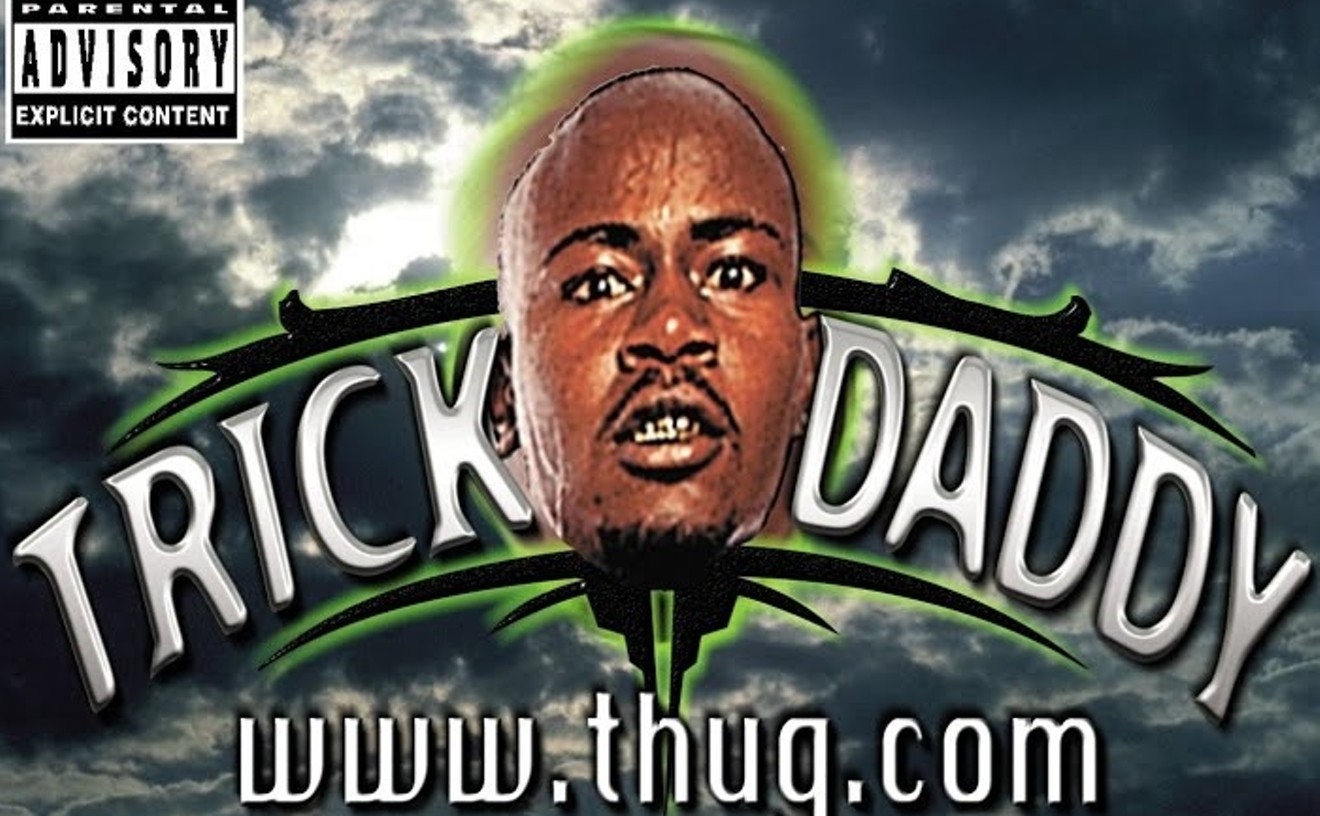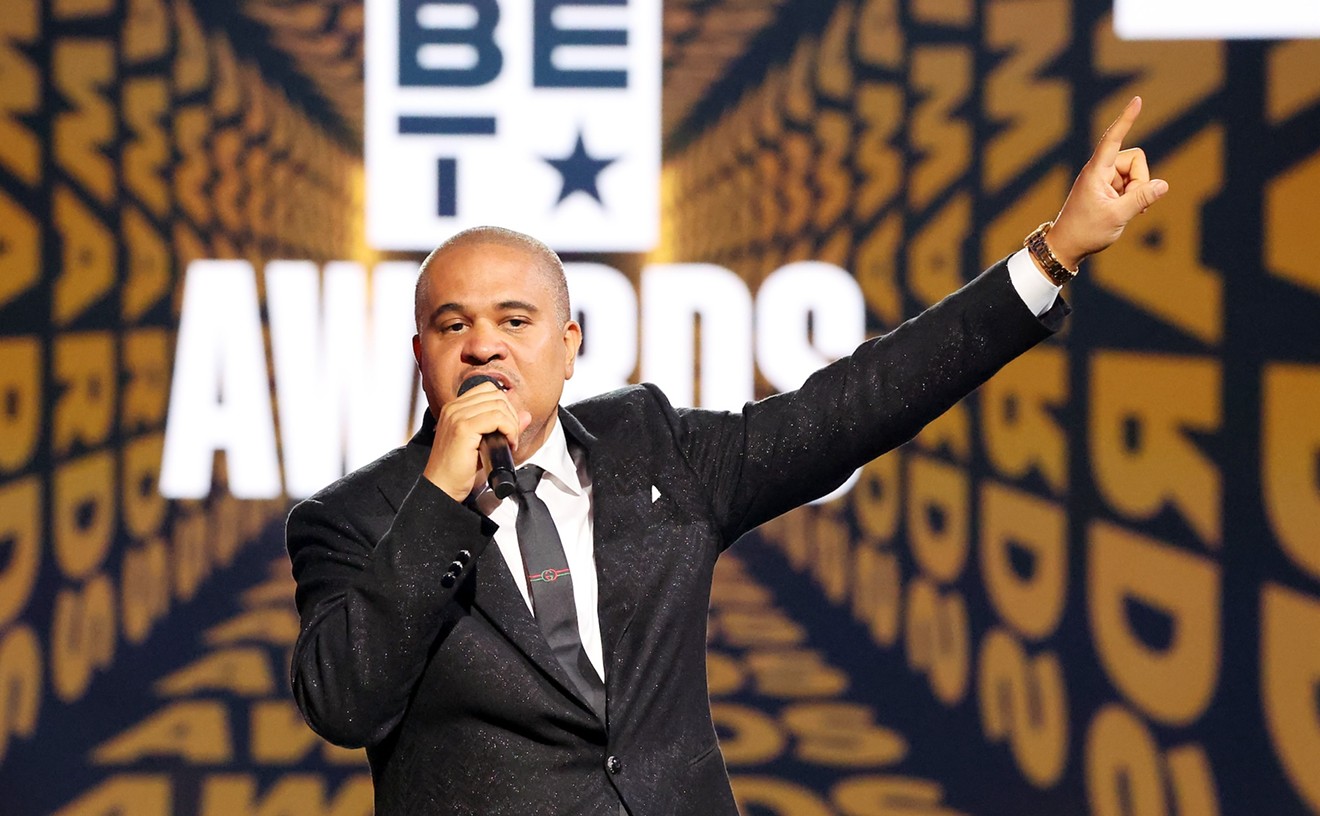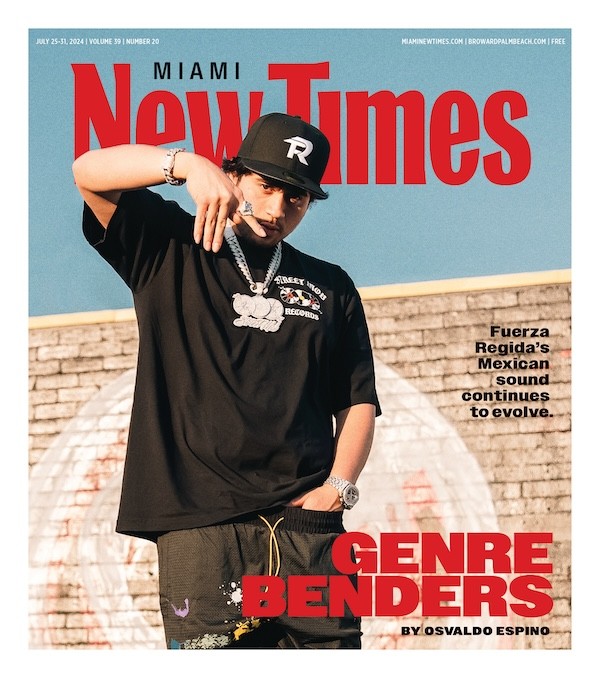No Quarter Pounder
(Birdcage)
According to official legend, Elvis Presley once remarked, "I may not be Led Zeppelin, but I can still pack 'em in." This was in the mid-Seventies, when Led Zep was the biggest band in the world and Elvis was, well, big. The twin ocean liners of Seventies bombast actually passed in the night a few times: Starstruck Zeppelin members had an audience with their idol after a Vegas show in '74; another time, a furious Presley once karate-chopped oafish Zep tour manager Richard Cole after he used profanity in the King's presence.
So two-thirds of Dread Zeppelin's uncanny shtick -- Elvis impersonator sings Zeppelin covers -- makes a sort of musicological sense. It's the reggae business that astounds. While the simple strangeness of the triple incongruity is enough to launch Dread Zeppelin and its repertoire of reggaefied Zep … la King into the novelty tune Hall of Fame, it is not the sort of concept you would think warrants a multialbum career. Nevertheless, Dread Zep has one: No Quarter Pounder is the fourth full-length CD the band has put together since its inception in 1989, and despite variations on the theme (their release It's Not Unusual introduced disco to the mix), by now the strange gag is officially beaten senseless.
For what it's worth, the band's charms remain as solid as ever; enormous lead singer Tortelvis has the kind of pipes that would make him a legend in any karaoke bar, and when the band strikes the right balance between its three clashing conceits, the resulting noises have a singular oddness that can usually elicit a smile. No Quarter's highlights include a horn-fueled "Ramble On" (humorous mainly because of Tortelvis's earnest reading of the Tolkien-gibberish lyrics) and a surprisingly faithful fusion of "How Many More Times" and "Teddy Bear," complete with a mumbly spoken-word bridge. Then there's "Brick House (of the Holy)," which throws licks from "Dazed and Confused" and about fifteen disco songs into the Commodores-based mutation. Along the way there are a few dirt-dumb novelty tunes, a moderately funny "What Is and What Should Never Be," and a droll "Viva Las Vegas" (with the "Custard Pie" riff morphed in); ultimately, a sense of desperation looms.
By David Dudley
Pansy Division
Wish I'd Taken Pictures
(Lookout)
Rumor has it that despite touring last year with Green Day, one of the most popular rock groups in the U.S., San Francisco's Pansy Division was never approached by a major label. Not that Dustin Donaldson, Chris Freeman, and Jon Ginoli would sell their collective soul for corporate glory if given the chance. It's this soul that makes Wish I'd Taken Pictures, Pansy Division's fourth album, remarkable, because, while better produced and recorded with a harder edge than their previous efforts, its musical vocabulary doesn't extend much further than the first few Ramones albums. And the lyrics mine familiar territory: gay sex, gay sex, and more gay sex, with self-explanatory song titles such as "Horny in the Morning," "Vanilla," and "Dick of Death" (gay argot for "well hung," but a poor choice of words nonetheless). Pansy Division's characteristic sexual playfulness, however, is tempered here by a bittersweet loneliness. Several songs -- "The Summer You Let Your Hair Grow Out," "Expiration Date," "Sidewalk Sale" -- address missed connections and solitude, while isolation undermines romance in "The Ache." Throughout Pictures, Pansy Division is courageously in-your-face, serving up powerful, pro-gay messages: no hemming, no hawing, and no apologies.
By Jeffery Kennedy
Aaron Jay Kernis
100 Greatest Dance Hits
(New Albion)
Rock musicians have appropriated facets of classical music for longer than they've sung "Roll Over Beethoven." In turn, classical composers are now appropriating the best and worst of popular culture for their works. In Christopher Rouse's orchestral piece Bonham, Led Zeppelin's late drummer wakes up in Symphony Hall, and in Desi, Lucille Ball's husband is similarly reanimated by composer Michael Daugherty. Charles Manson, Marilyn Monroe, and Richard Nixon have had operas written about them. (Can The Flintstones be far behind?)
Composer Aaron Jay Kernis was born in 1960 and could hardly have avoided flower-power influences in his sensitive years, but other eras of American pop culture charmingly invade his 100 Greatest Dance Hits. This collection of five pieces is Kernis's witty tour of music that you never asked for and certainly never needed, and its final section finds a guitarist and a string quartet having the same brain spasm and exclaiming "dance party!" to the deadening thud of a drum machine. Jerry Lee Lewis on a massive dose of Dexedrine would have sounded just like Kernis's Superstar Etude #1, complete with orgasmic cries of "Oh baby!!" And another kind of fever, namely the disco variety, infects the title work. Finally, America(n) (Day) Dreams, for mezzo-soprano and ensemble, alludes to Apollo 17 and a breakfast with whales at New York City's Waldorf Astoria that conjures images worthy of Sixties-era pop psychedelia.
Kernis's glittering orchestral works are grabbing the attention of critics, but this collection of mostly gentle, sensuous works for smaller ensembles is equally promising. He looks like the guy who sat next to you in homeroom whose glasses were held together by duct tape, but he's on the leading edge of modern classical music. As if to emphasize that fact, New Albion has issued this disc as a "CD Plus," with a multimedia track for Macintosh and Windows systems.
By Raymond Tuttle
Lou Reed
Set the Twilight Reeling
(Warner Bros.)
Like some kind of rock and roll Mr. Spock, once every decade the ice-cold, bug-eyed Lou Reed falls in love and feels like singing to the world. Back in '76 he made Coney Island Baby, a warm and tender love letter to his transvestite partner Rachel. In '84 it was New Sensations, about rediscovery, adulthood, and hetero love with then-wife Sylvia. This year, though, perhaps Lou has met his match: The object of his swooning obsession is performance artist and new girlfriend Laurie Anderson. Set the Twilight Reeling bubbles with a whole batch of new sensations, making it one of Reed's brightest and friendliest records in years.
Most times with Reed the subject matter is dour, as on the death-filled Magic & Loss or the street-tough New York, with Lou talking his way through the songs, as if injecting any melody into his dry vocals would distract from the heaviness of it all. But on Twilight, as with his past puppy-love albums, melodies abound: "NYC Man," "Trade In," "Hang On to Your Emotions," and the title track are all touchy-feely pop songs, by Lou's standards, complete with acoustic guitars, jazz chords, and aw-shucks lines such as "I want to make her my wife."
Of course it's not all goo-goo and ga-ga. Reed takes a vicious and viciously funny stab at the GOP's prudish hypocrisy ("Sex With Your Parents"), and remembers his late Velvet Underground cohort Sterling Morrison in "Finish Line," a stark elegy that would fit comfortably on Magic & Loss. But as Twilight ends with songs as sweet as "Egg Cream" and as goofy as "HookyWooky," we're simply left kvelling over Lou's true and lasting love, his romantic discovery cutting to the essence of what rock and roll's all about.
By Roni Sarig
Peter Tosh
The Toughest
(Heartbeat)
For too many years, the accomplishments of Peter Tosh have been dwarfed by the mountainous legacy of Bob Marley, reggae's greatest artist and Tosh's former bandmate (along with Bunny Wailer) in the Wailers. Tosh recorded sporadically as a solo artist during his tenure with that groundbreaking ska ensemble, and landed a few hits in Jamaica before leaving the band in 1973, complaining that Marley kept him in the background. He found celebrity in the U.S. a few years later when he signed with Rolling Stone Records, and cut a duet with Mick Jagger on a cover of the Temptations' "Don't Look Back." Yet his work for the label, although politically charged, paled in comparison to his early-Seventies collaborations with reggae Renaissance man Lee Perry, who, as producer, placed Tosh's gruff baritone amid a fluid mix of rumbling bass, crashing percussion, and slinky, soul-steeped grooves. Many of those tracks, as well as Tosh's finest vocals with the Wailers, have languished on countless multiartist compilations or been buried on the Marley-intensive Wailers collections.
Until now. The Toughest pulls together those tracks and documents Tosh's prime years, from his formative mid-Sixties solo recordings to early-Seventies landmarks such as "Brand New Second Hand" (heard here in two equally fine takes). Both the hard-skanking obscurity "Hoot Nanny Hoot" (Tosh's first lead vocal with the Wailers) and the rollicking "Maga Dog" define the exuberance of early ska, while "Sinner Man" is a gorgeous slice of reggae gospel that remained in Tosh's live sets up to his death in 1987. It's the six Perry-produced tracks, though, that capture Tosh at his peak: "400 Years" and "No Sympathy," in particular, are artful summaries of Tosh's rage at the racism and injustice in his Jamaican homeland.
By John Floyd











